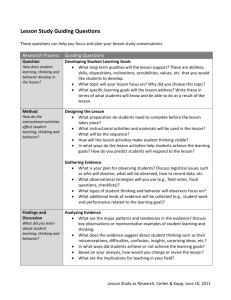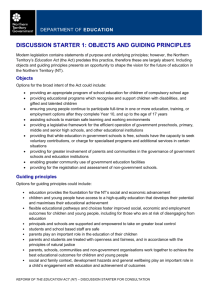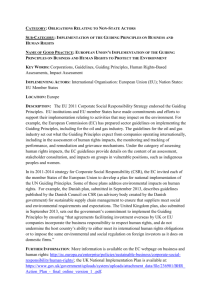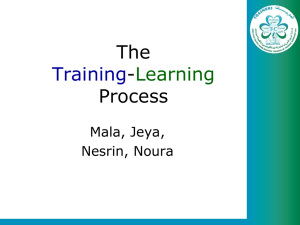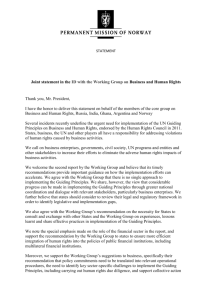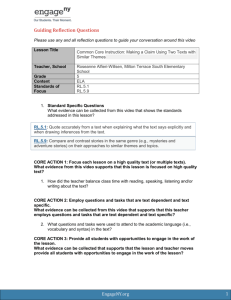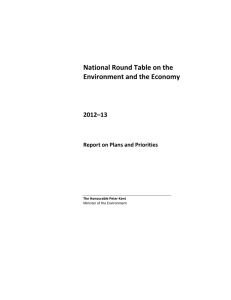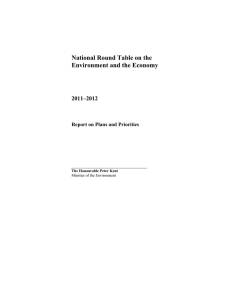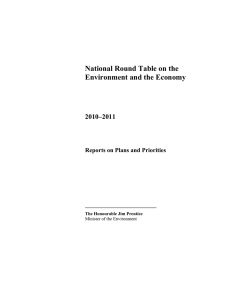Guiding Principles of Consensus Processes
advertisement
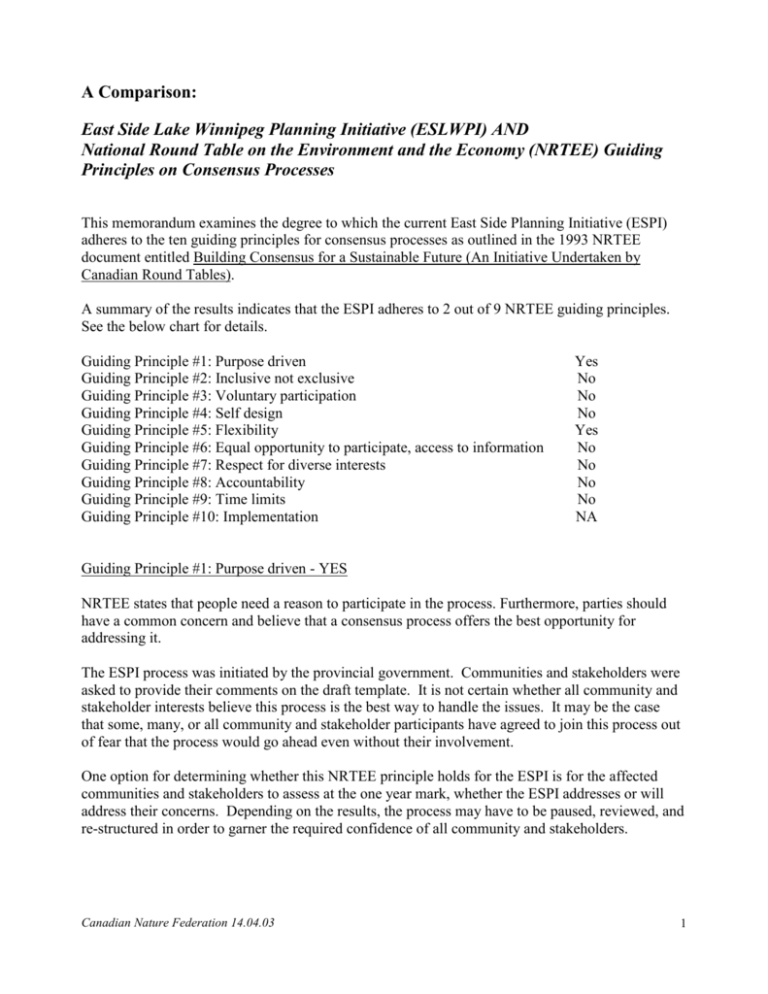
A Comparison: East Side Lake Winnipeg Planning Initiative (ESLWPI) AND National Round Table on the Environment and the Economy (NRTEE) Guiding Principles on Consensus Processes This memorandum examines the degree to which the current East Side Planning Initiative (ESPI) adheres to the ten guiding principles for consensus processes as outlined in the 1993 NRTEE document entitled Building Consensus for a Sustainable Future (An Initiative Undertaken by Canadian Round Tables). A summary of the results indicates that the ESPI adheres to 2 out of 9 NRTEE guiding principles. See the below chart for details. Guiding Principle #1: Purpose driven Guiding Principle #2: Inclusive not exclusive Guiding Principle #3: Voluntary participation Guiding Principle #4: Self design Guiding Principle #5: Flexibility Guiding Principle #6: Equal opportunity to participate, access to information Guiding Principle #7: Respect for diverse interests Guiding Principle #8: Accountability Guiding Principle #9: Time limits Guiding Principle #10: Implementation Yes No No No Yes No No No No NA Guiding Principle #1: Purpose driven - YES NRTEE states that people need a reason to participate in the process. Furthermore, parties should have a common concern and believe that a consensus process offers the best opportunity for addressing it. The ESPI process was initiated by the provincial government. Communities and stakeholders were asked to provide their comments on the draft template. It is not certain whether all community and stakeholder interests believe this process is the best way to handle the issues. It may be the case that some, many, or all community and stakeholder participants have agreed to join this process out of fear that the process would go ahead even without their involvement. One option for determining whether this NRTEE principle holds for the ESPI is for the affected communities and stakeholders to assess at the one year mark, whether the ESPI addresses or will address their concerns. Depending on the results, the process may have to be paused, reviewed, and re-structured in order to garner the required confidence of all community and stakeholders. Canadian Nature Federation 14.04.03 1 Guiding Principle #2: Inclusive not exclusive - NO NRTEE states that all parties with a significant interest in the issues should be involved in the consensus process. Furthermore, care needs to be taken to identify and involve all parties with a significant interest in the outcome and that it is sometimes appropriate for those representing similar interests to form a caucus or coalition. NRTEE further states that the integrity of the process may be compromised if the parties are not given the opportunity to determine their representatives through their own processes and mechanisms, particularly in circumstances where the direct interests of the parties will be affected by the outcome. While the government has invited many affected communities and stakeholders to participate in the process, the Planning Table as a body, notwithstanding Section 35 of the Executive Summary, does not meet this NRTEE guiding principle. Section 28 of the Executive Summary states that the Planning Table be comprised of members appointed by the Conservation Minister. Section 35 of the Executive Summary states that the First Nation Council be comprised of a representative from First Nation communities and the Advisory Committee be compromised of appointed representatives of their organizations. To date, environmental organizations are not able to fully participate. Guiding Principle #3: Voluntary participation - NO NRTEE states that parties who are affected or interested participate voluntarily and that the strength of a consensus process flows from its voluntary nature. All parties must be supportive of the process and willing to invest the time necessary to make it work. A consensus process may compliment other processes. It asks the parties to make their best efforts to address issues through consensus. If that process fails, participants are free to pursue other avenues. The ESPI is a voluntary process only in the sense that affected communities and stakeholders can choose whether they will participate in the process. However, by not choosing to participate, affected communities and stakeholders run the risk of being left out of a regional planning process whose results will likely affect them. Therefore, the ESPI does not adhere to the spirit and intent of the NRTEE guiding principle. Guiding Principle #4: Self Design - NO NRTEE states that “the parties need to design the consensus process” and that all parties must have an equal opportunity to participate in designing the process. NRTEE believes that it is important to take time at the beginning to define the issues clearly, assess the suitability of a consensus process for each issue, clarify roles and responsibilities, and establish the ground rules for operating. The Manitoba Government provided opportunities for many affected communities and stakeholders to comment on the draft template. Beyond these opportunities, notwithstanding any and all changes to the original template in response to public comments, the ESPI has largely been the design of government officials. Therefore, the ESPI does not comply with this NRTEE guiding principle. Canadian Nature Federation 14.04.03 2 Guiding Principle #5: Flexibility - YES NRTEE believes that flexibility should be designed into the process since it is impossible to anticipate everything in a consensus process. The ESPI does seem to have certain levels of flexibility within its operational design. Time will tell, as recommendations, resource needs and information requests are identified, whether flexibility will continue. Guiding Principle #6: Equal Opportunity - NO NRTEE believes that all parties should have “equal access to relevant information and the opportunity to participate effectively” throughout the process. Equal access to information and equal opportunity to participate do not yet seem to exist within the Planning Table and its councils / committees. Important information is being provided to Planning Table members late and is posted on the government web site and in the public registry file on a selective basis with presentations to the Table not being posted. Sections 33 and 40 of the Executive Summary state that all Planning Table members, including the members on the First Nation Council and the Stakeholder Advisory Committee, be paid their expenses in accordance with the government’s general manual of administration. Other recommended forms of support for community participation such as community planning funds - have not been put in place. Guiding Principle #7: Respect for Diverse Interests - NO NRTEE states that it is essential to provide effective opportunities to achieve acceptance of the diverse values, interests, and knowledge of the parties involved in the consensus process. According to NRTEE, this allows participants to move beyond bargaining over positions to explore their underlying interests and needs. The ESPI aims to achieve acceptance of the diversity of perspectives and interests within the Planning Table and supporting committees/councils. To date, the majority of meeting / presentation time has been used for development intention presentations, leaving less time for other perspectives and interests, and resulting in an information base that is weighted in favour of development interests, not land use planning. Guiding Principle #8: Accountability - NO NRTEE states the participants are accountable both to their constituencies and to the process that they have agreed to establish. NRTEE further states that it is important that the participants representing groups or organizations effectively speak for the interests they represent. Mechanisms and resources for timely feedback and reporting to constituencies are crucial and need to be Canadian Nature Federation 14.04.03 3 established. Given the significant public concern about environmental, social and economic issues, keeping the public informed on the development and outcome of any process is important. According to Section 29 of the Executive Summary, members appointed to the Planning Table represent the public interest and not their organizations. Section 36 of the Executive Summary states that the members of the First Nation Council and the Advisory Committee represent either the community or organization to which they are affiliated. Therefore, the ESPI does not accord with this NRTEE guiding principle. Guiding Principle #9: Time Limits - NO NRTEE states that realistic deadlines are necessary throughout the process. NRTEE also states that sufficient flexibility is necessary to embrace shifts or changes in timing. The ESPI requires the Planning Table to complete a broad area plan by September 2004. Section 24 of the Executive Summary states that the east side plan be prepared using the best available information within the established time table subject to future amendments as new and better information becomes available. Section 27 of the Executive Summary states that an East Side Planning Table be established to provide recommendations, within established deadlines, on the preparation, content and implementation of a broad area plan for the east side Lake Winnipeg planning area. A current problem exists – in that to date the timetable, schedule and plan for the operation of the Planning Table have been in constant flux. No milestones exist. Guiding Principle #10: Implementation - ? ? NRTEE states that a commitment to implementation and effective monitoring are essential parts of any agreement. Section 20 of the Executive Summary states that the completed plan will include procedures for the regular review and amendment of the approved plan. There are currently no available details on issues concerning: public review for appropriateness; application of the East Side Plan; implementation; or monitoring of the plan, once completed. Nor is there any information regarding how recommendations in a planning document would be applied, or how any subsequent decisions would be made. Current review of the Planning Act – without notification to the ESPI Table – potentially confuses participants, especially as further review of the land use planning policies under the Act is intended for later in 2003. Therefore, it is considered premature to assess this particular guiding principle in the context of this memorandum. Canadian Nature Federation 14.04.03 4
